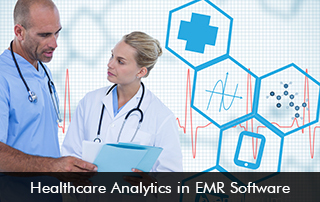To unlock the potential of the vast data stored in Electronic Medical Records (EMR) Software healthcare analytics tools in the system can be leveraged by providers. Healthcare analytics functionality in the EHR Software can empower clinicians to assess patient data and help reveal important insights about various medical conditions.
Main Components of Healthcare Analytics in EMR System
Electronic Health Records Software healthcare analytics can transform raw data into actionable insights. This data can then be used by providers to support their decision-making at the point of care and as a result, enhance patient care and outcomes.
To understand healthcare analytics at its best let’s look at its main mechanisms:
Data Collection and Integration
The various amounts of data include patient data, clinical data, operational data, and external data sources from public health databases. All of this data is included in the Electronic Medical Records (EMR) Software to be accessed easily by healthcare providers in real time.
Data Analysis
Data analysis combines various analytics such as,
- Descriptive Analytics – Used for report generation on patient outcomes and performance levels.
- Predictive Analytics – Machine learning is used to predict outcomes based on past results.
- Prescriptive Analytics – This includes recommendations for providers such as treatment suggestions, and customized treatment plans.
- Real-Time Analytics – Facilitates prompt data analysis.
EMR Software Dashboards and Visualization Tools
Visual representations of measurements, data trends, and key performance indicators (KPIs) are available on the EHR Software’s interactive dashboard. Healthcare administrators and providers may easily understand complicated data insights with the aid of these tools.
Benefits of Healthcare Analytics in EHR Software
Improved Patient Care
Healthcare analytic tools can be leveraged by providers to offer personalized care to patients. The recommendations and real-time analytics can lead to safer and more effective patient treatments.
Administrative Efficiency
EMR Software analytics can contribute to operational productivity by automating data entry tasks. The analytics can also automatically assign various tasks based on predefined rules. Furthermore, daily patient scheduling can be optimized by leveraging healthcare analytics to identify patterns in patient appointments. This can help curb the issue of increased patient wait times, as a result providing smooth patient experiences.
Improved Accuracy
Human errors in clinical documentation, billing processes, and data entry tasks are reduced with the usage of EHR Software analytics. The improved accuracy in daily processes enhances patient satisfaction scores and results in provider efficiency.
Moving Ahead
Analytics is the powerhouse of healthcare organizations to get insights into clinical, operational, and financial goals. Healthcare analytics in Electronic Medical Records Software is a great way to improve public health, and preventive medicine and even reduce healthcare costs by using data the right way.







